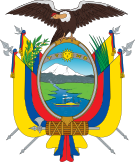2017 Ecuadorian tax haven referendum
| ||||||||||||||||||||||
Do you agree that, in order to hold a position of popular election or to be a public servant, it is established as a prohibition to have assets or capital, of any nature, in tax havens? | ||||||||||||||||||||||
| Results | ||||||||||||||||||||||
|---|---|---|---|---|---|---|---|---|---|---|---|---|---|---|---|---|---|---|---|---|---|---|
| ||||||||||||||||||||||
 |
|---|
|
|
A referendum on banning politicians and civil servants from having bank accounts or companies based in tax havens was held in Ecuador on 19 February 2017, alongside general elections.[1] The proposal was approved by voters, giving officials one year to transfer their assets or be removed from their posts.[2]
The question on the ballot was "Do you agree that, for those holding a popularly elected office or for public servants, there should be a prohibition on holding assets or capital, of any nature, in tax havens?"[3]
Classification of tax havens[edit]
In preparation for the referendum, the Ecuadorian Internal Revenue Service issued a resolution outlining the criteria for a jurisdiction to be considered a tax haven, establishing two categories: Preferential tax regimes, and low tax jurisdictions.[4] A preferential tax regime was classed as a jurisdiction whose effective tax rate is below 60% in relation to the Ecuadorian corporate income tax (CIT) rate of 13.2%.[4] A low tax jurisdiction was classed as having an effective tax rate below 60% in relation to the Ecuadorian CIT of 13.2% and no substantial economic activity.[4] The IRS may remove a country from their list of tax havens if it reforms its tax policy, if it enforces a treaty to avoid double taxation, including a special information exchange clause, or if its laws do not include banking confidentiality, securities or other regulations that prohibit sharing information with the Ecuadorian IRS.[4]
Along with this definition, the Ecuadorian IRS published a list of countries which currently meet the definition of a tax haven under their law.[4] This list included 28 jurisdictions in the Americas, 19 in Oceania, 16 in Europe, 13 in Asia, 9 in Africa and two other island territories.
Campaign[edit]
Outgoing President Rafael Correa stated that he would campaign in favour of the proposal, having previously stated that tax havens were one of the biggest issues for democracy.[5]
Results[edit]
| Choice | Votes | % |
|---|---|---|
| Yes | 5,030,579 | 55.12 |
| No | 4,096,559 | 44.88 |
| Invalid/blank votes | 1,336,496 | – |
| Total | 10,472,302 | 100 |
| Registered voters/turnout | 12,816,698 | 81.64 |
| Source: CNE Archived 2020-09-25 at the Wayback Machine | ||
Notes[edit]
- ^ a b c d e f g h i British Overseas Territory
- ^ a b c Part of the
 Kingdom of the Netherlands
Kingdom of the Netherlands
- ^ a b
 United States unincorporated territory
United States unincorporated territory
- ^ a b Overseas Collectivity of
 France
France
- ^ a b
 British Dependency
British Dependency
- ^ External Territory of
 Australia
Australia
- ^ a b Free Association with
 New Zealand
New Zealand
- ^ Free Association with the United States
- ^ Dependent territory of New Zealand
References[edit]
- ^ Referendum on tax havens will be conducted in the elections of 2017 Archived 2016-12-24 at the Wayback Machine Ecuador Times, 22 November 2016
- ^ Ecuador Revives Campaign for UN Tax Body IPS News, 27 January 2017
- ^ Republic of Ecuador: Referendum IFES
- ^ a b c d e Ecuadorian IRS issues resolution with new list of tax haven jurisdictions Archived 2017-02-23 at the Wayback Machine EY, 9 February 2015
- ^ President Correa: tax havens are one of the biggest problems in our democracies Andes, 29 July 2016
